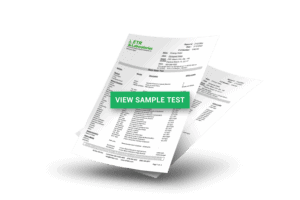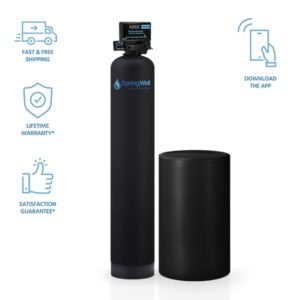How To Test Water For Calcium And Magnesium
What Is Hard H2o & How To Test For Hardness
If you've e'er experienced any signs of "hard" water in your home, your first instinct is likely to effigy out the steps to ready the problems – apace. To briefly refresh your retentivity, difficult water unremarkably causes certain inconvenient, embarrassing and costly issues such as:
- Spotty, filmy dishes and glassware;
- Ugly stains in sinks and tubs;
- Low water pressure due to clogged pipes;
- College electricity bills;
- Harm to water-heating systems, among others.
It's no wonder why hard water is one of the nigh common household problems in America, affecting 85% of homeowners across the state.
The first step to combating hard water problems is to exam your h2o for hardness and measure out its hardness level. You can achieve this past implementing a hard water test and then you can make up one's mind if your h2o is hard, how hard it is, and the best treatment method to utilize. The about authentic hard water examination is done through an independent laboratory, using a h2o sample you lot provide. Nonetheless, a comprehensive water test kit can be pricey and tin take a while for the results.
For faster and cheaper – less authentic – results, try i of the methods below to get a proficient estimate of your water's hardness level.
1. Quick Soapsuds Water Bottle Test
One of the easiest and quickest options for a hard water test is the Soapsuds Test. To conduct out this test, you need a clear, clean, empty glass or plastic bottle with a tight-fitting cap. Fill the canteen about 1-tertiary with water directly from your tap, add a few drops of pure liquid soap and shake vigorously for about 15 seconds. Next, set the bottle downward and observe the solution.
If there are no fluffy bubbles in the water or information technology appears cloudy and/or milky, your h2o is hard. Soft water would foam upwards quickly and create bubbles, and the resting water at the bottom would exist clear. You lot take to keep in mind, however, that some soaps are formulated with detergents, then they lather regardless of your water type. For the best results, employ a basic soap, such as Castile. Soaps similar this one accept no dyes, detergents or perfumes.
two. Check with Your Metropolis or H2o Provider
If you become your h2o through a municipal service line, you tin contact your local water provider and ask for their latest water quality report. Many of these utilities as well post their reports online, and so y'all can do a quick search. Some of the reports can be very technical, so y'all must know how to read and understand a water quality report.
A drawback of this option is that the reports might not necessarily reflect the water quality direct at your tap considering the water is tested earlier leaving the treatment facility and can pick up impurities from the piping on its way to your home. Despite that, water quality reports can provide a adept idea of the h2o hardness in your area.
Most utilities report their water hardness numbers in milligrams per Liter (mg/L) as calcium carbonate.
3. Use a High-Quality Hard Water Test Kit
 A home water exam kit is the simplest (and probably the best) manner to cheque your water for hardness minerals. A regular kit commonly includes water test strips and a colour chart. You can purchase a test kit from a local home comeback store or a reputable online retailer. We offer a premium line of water test kits that tests but for specific contaminants as well as overall h2o quality, pH and safety.
A home water exam kit is the simplest (and probably the best) manner to cheque your water for hardness minerals. A regular kit commonly includes water test strips and a colour chart. You can purchase a test kit from a local home comeback store or a reputable online retailer. We offer a premium line of water test kits that tests but for specific contaminants as well as overall h2o quality, pH and safety.
Three common types of h2o examination kits are bachelor for purchase, namely water test strips, color deejay kits, and digital testing kits. Water test kits are the most popular of the 3. They are small, single-use strips that change color based on the presence of certain contaminants.
To apply the strip, fill up a container with water from your tap, so immerse the test strip in the water. Next, compare the resulting colour of the strip to the color chart provided with the kit. Each color on the chart corresponds to the hardness of your water, with results measured in grains per gallon (gpg). The instructions will tell you how hard your h2o is based on the consequence.
How is Water Hardness Measured?
Most water hardness tests written report hard h2o levels in grains per gallon (g). However, some laboratories use milligrams per Liter (mg/L), or parts per million (ppm). I part per million is simply stating that out of ane 1000000 units, one unit is a difficult h2o mineral. Grains per gallon is the equivalent of ane dry grain of wheat or about ane/7000 of a pound. It takes 17.1 ppm to equal to 1 gpg.
If your hard h2o test displays or produces the result in parts per million or milligrams per liter, you lot can take the total hardness level and divide it by 17.one to determine the hardness in grains per gallon. For instance, if your hard water test shows 182 mg/L, yous have 10.half-dozen gpg. You lot tin convert mg/50 or ppm by dividing the total hardness by 17.ane to go the grains per gallon hardness.
Here'southward a unproblematic h2o hardness formula using American caste equivalent to mg/Fifty:
H2o hardness (mg/Fifty) = Ca(mg/50) ten two.497 + Mg(mg/L) 10 4.118
Ca = Calcium content
Mg = Magnesium content
Water Hardness Scale: How to Interpret the Water Hardness Testing Results
The U.S. Geological Survey uses the following scale to determine the hardness of the water. Note the value of the calcium carbonate in your water quality report or your test kit results and compare it to the scale beneath.
| Classification | Mg/L or ppm | Grains per Gallon (gpg) |
| Soft | 0 – 17.one | 0 – i |
| Slightly difficult | 17.1 – 60 | 1 – iii.5 |
| Moderately hard | 61 – 120 | 3.5 – vii.0 |
| Hard | 121 – 180 | 7.0 – 10.5 |
| Very hard | 180+ | 10.5+ |
In short, if your hard water test result is less than ane grain per gallon (17.1 mg/L or less), yous accept soft water. Annihilation higher than this value indicates difficult water.
How to Treat Difficult Water Effectively

Just because the examination results indicate that you accept hard water doesn't mean you have to sit back and live with its damaging effects. Traditionally, salt-based water softeners have been used to treat difficult h2o by replacing hard h2o minerals ions with sodium ions. While constructive, salt-based softeners discharge a lot of salty wastewater, which somewhen ends upwards in the natural environment, affecting plants and animal life. The salt content can also have adverse effects on people who require depression-sodium diets.
The salt-free alternatives, however, offering a more environmentally-friendly way of controlling water hardness. These softeners crave no electricity and produce no wastewater. They soften h2o by crystallizing the hard water minerals so they no longer stick to surfaces, thus reducing scaling. Unlike table salt-based water softeners, the non-salt variants do not require you to recharge the system with common salt, which significantly reduces maintenance costs.
While at that place are several differences between salt-based water softeners and salt-gratuitous water softeners, choosing the right type all depends on your situation and personal preference. If you need any assistance picking the one that is virtually suited for your needs, don't hesitate to contact united states.
Verdict
Hard water is no stranger to many households in the U.S., damaging almost annihilation that it comes into contact with. But by testing your water with the three easy methods above, you can stop difficult water in its tracks and remove it from your home earlier it does any damage. Springwell Water Systems is here to help y'all accomplish that and more, and so delight reach out to today to get started.
How To Test Water For Calcium And Magnesium,
Source: https://www.springwellwater.com/3-easy-ways-to-test-for-hard-water/
Posted by: cadizfluentsmay.blogspot.com


0 Response to "How To Test Water For Calcium And Magnesium"
Post a Comment